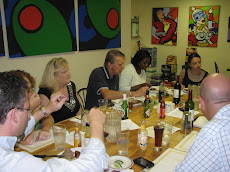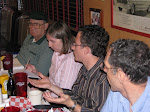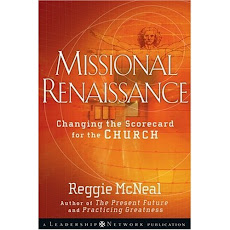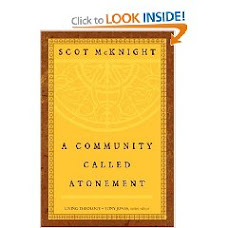 "Part of the joy of church is worshipping with people you love."
"Part of the joy of church is worshipping with people you love."- Melissa
Twelve of us, including several newcomers, gathered on July 14th at Laura’s Cuban Restaurant to continue our conversation about emerging, missional and organic church and what it means to us. The diversity of Christian traditions represented at the table was interesting to note. We came from Episcopal, Adventist, Methodist, Presbyterian, Catholic, Baptist, Pentecostal and Salvationist backgrounds to name a few. Since our first Meetup was a year ago, we started to discuss how the conversations have impacted the way we live our lives. First, Melissa told her story of how she came to know about emerging Christianity and how she came to our table.
Melissa’s family included many pastors and missionaries. She spent much of her childhood with her family in the mission field and working for churches in places like Haiti and Dominican Republic before moving to Tennessee and finally South Florida. When she was finally settled in school her family declined to move once again to Africa since that would have meant boarding school for her and her siblings. They came to Broward County after the church in Tennessee closed their missions training program leaving her father jobless. This disappointment influenced her feelings about denominational, organized churches and how they can sometimes actually damage the lives of the families that are part of them.
Once in Broward County, Melissa’s father continued pastoral work in the denomination and did telemarketing on the side. During this time, she was exposed to and took part in many opportunities for service to those in need. This included outreach to children in the impoverished Overtown section of Miami every Saturday. Despite its challenges, these experiences taught her that serving others is simply part of what it means to be a Christ-follower.
Melissa eventually became a leader in her church youth group and became involved in Intervarsity. Shortly after High School graduation, Melissa’s sister moved to Mongolia to do missions and many of her friends moved away. During this time, God was able to demonstrate for her the importance of Christian community, which includes service to others. Also during this time, she met Robin M., who would become her husband, at a Bible Study in her house.
Eventually, Melissa began to visit other churches including a house church in her home and went to other churches with friends. She described these visits as tortuous, and the churches as either dull or over the top with emotionalism. She finally settled on the house church at her parent’s. Here she found real discussions about things that mattered. Melissa worked in homeless services at the time and the house church started gathering at one of the shelters. Her father stopped doing pastoral work at the large church they had been attending. Although the congregation was large, there was little participation in service or community and few new people were joining. He, and a few others, led this church gathering in the shelter for a time. So, for Melissa, gathering at the shelter for church meant that faith and her work that she loved with the homeless interacted in a missional way.
One day, Melissa’s husband Robin M. shared with her that he was thinking that he should go to school and become a pastor. Her reaction was, “of course you should,” and they moved to Canada where Robin attended seminary and interned at a local church. Here, Melissa and Robin met people who really cared about them. This care was not only about asking how they were doing but caring in practical ways, like baby-sitting. The focus now was on small church planting. During this time Melissa and Robin made connections with people who changed their lives, encouraging them to grow and to care about others around them. They learned that part of the joy of church is worshipping with people you love.
Once back at home in Broward County, Melissa and Robin started visiting “regular” church for a time. Then they began a small church gathering in their home and they have been privileged to participate with others in community. Returning to work with the homeless they are again able to see the missional interaction of faith with serving and helping and getting to know others. Melissa said that she doesn’t necessarily read all the books on emerging church, but simply looks to see what works or doesn’t work in practice. One thing she enjoys about our gatherings is the combination of fellowship and food. Anthony brought up that sharing meals has been, and should always be, a big part of “church.”
Next, we discussed some of the reasons behind the move towards emerging, missional and organic church. Michelle said that church is not about going to a building but that the she sees the Holy Spirit drawing more people towards relationship with Jesus and meeting the needs of others. Talking about small church gatherings compared to mega-churches, Kennedy said that he was able to find real community when he was at Willow Creek, a congregation of 18,000. He felt the key was the intentional way the people there went about relating to others, including newcomers. Beth said that she has seen few large churches like this. Michelle felt that fear of intimacy contributes to the anonymity found in many churches. For Kathy, worship and service to others is a key to what church is.
Finally, Anthony mentioned that one thing that is too often missing from church teaching and practice is attention to the importance of loving oneself. After all, we are taught to “love your neighbor, as yourself.” And without a healthy regard for self, it is difficult to share a healthy love with others. Steve W. said that Scot McKnight views “atonement” as having four directions: love for God, love for others, healing within oneself (along the lines of what Anthony was saying) and love for God’s world. We talked about God’s unconditional, sacrificial love for us, since we were created in His image, and the negative side of self-love which can be the problem of pride. Kennedy has heard the balance expressed this way - Jewish tradition relates the story of a rabbi who sought to understand his place in the universe. To keep a balance between too much pride and too much self-loathing, he had two notes, one for each of his two pants pockets. One note read: “For me the world was created.” The other note read: “I am nothing more than dust and ashes.” The task of the rabbi is our task: to integrate these two messages and keep them in appropriate balance.
We decided to meet again in a month to continue our conversation and share another meal together.
Blessings,
Steve W.













No comments:
Post a Comment